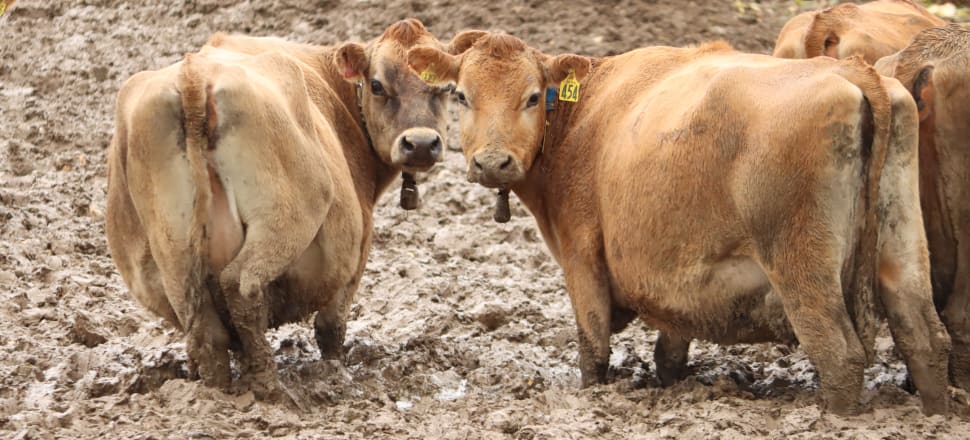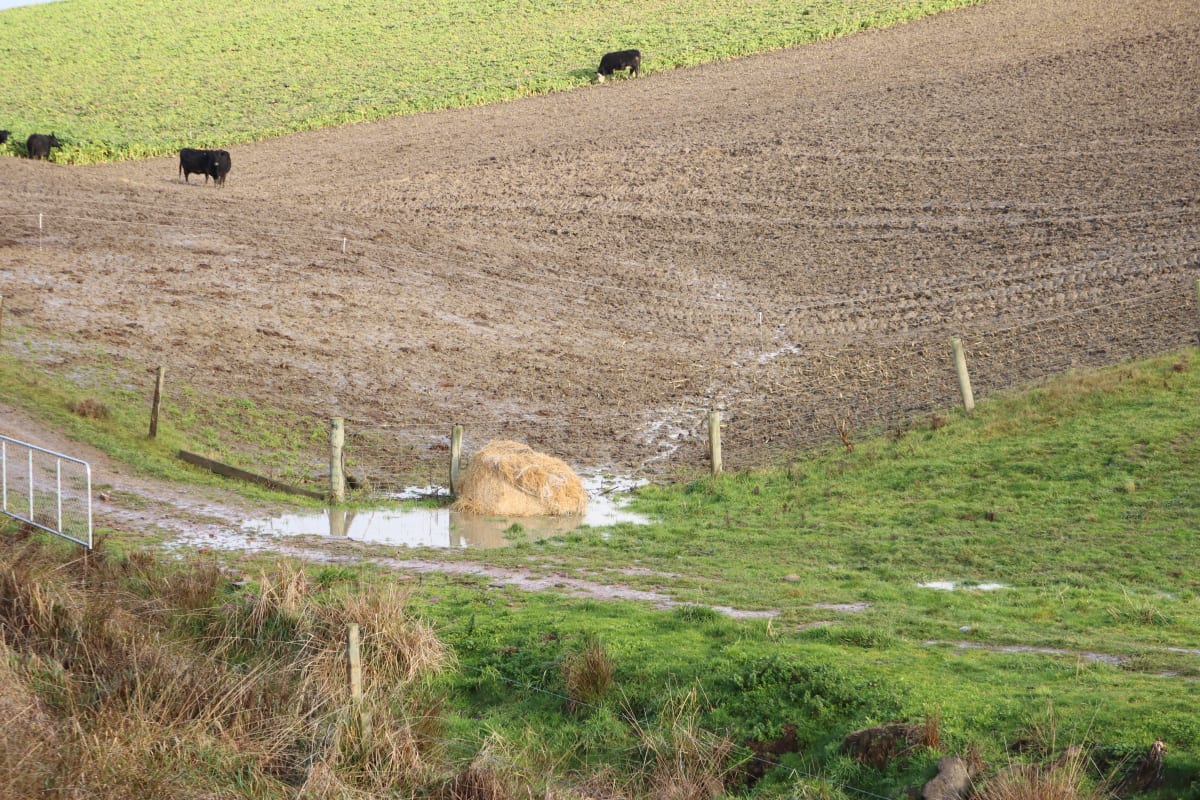
Farm decision might set a precedent for winter grazing consents
The gate’s been left open for animal welfare to be considered in winter grazing consent applications.
Pahia Dairies Ltd owns a 419-hectare farm west of Invercargill, located between Colac Bay and Orepuki. It bought a 100ha block in 2017 and expanded its operation onto the land, known as the Browns Block.
However, last year it was pulled up by the regional council, Environment Southland, which issued an abatement notice for farming without a resource consent.
READ MORE: * Councils’ winter grazing approach raises concern * Beef with Macca’s over ‘mud-farming’
Subsequently, Pahia – part-owned by North Americans Doug and Mari Harpur, named in a 2019 RNZ investigation into the country’s top 50 private landowners – applied for consents to expand its farm onto the Browns Block, and plant crops on some of the sloping land for intensive winter grazing.
(The controversial practice involves planting forage crops, like fodder beet, to feed cattle during cold and wet winters, when there’s limited pasture growth. Ministry for Primary Industries’ website says: “When done poorly it can have serious negative effects on animal welfare and the environment.”)
Pahia Dairies’ consent application was publicly notified and one submission was received, from the Animal Law Association. “The authority must consider the potential adverse effects of the proposed intensive winter grazing on the cattle before approving this application,” the association’s submission said.
The dairy company made what’s called a strike-out application – an attempt to knock out the submission and avoid a hearing.
However, last month independent decision-maker Clare Lenihan declined the application.
Environment Southland’s consents team leader Lacey Bragg confirms no challenge has been made against the strike-out decision.
It’s worth noting it was a preliminary decision, and hasn’t been confirmed by a court.

Federated Farmers’ national board member Mark Hooper, whose responsibilities include Resource Management Act (RMA) reform, was surprised by Lenihan’s decision.
Animal welfare issues are important and need to be addressed, he says, but they’re usually covered by the Animal Welfare Act.
“As far as we’re aware, there’s no precedent for that so it does seem a little unusual,” says Hooper, a Taranaki dairy farmer. “This only adds more confusion and more layers of regulation in terms of the consenting process.”
Of Pahia Dairies, he says changing the existing dairy operation would expand winter grazing over a wider area, and cows would be milked on soils less suited to winter grazing. “They’re looking at better environmental outcomes.”
A public outcry about winter grazing, focused on animal welfare concerns, led the government to establish a winter grazing taskforce in 2019.
New rules were announced aimed at high-risk practices, and this year farmers who don’t meet certain conditions need consents from regional councils to undertake winter grazing.
Already, environmentalists have reservations about how new freshwater regulations are being applied.
Environment Southland’s first monitoring flight spotted areas of interest in June, after which five “cease and desist” abatement notices were issued. Earlier this month, however, those notices were cancelled because, the council said, farmers took appropriate action.
Greenpeace Aotearoa’s climate campaigner Christine Rose says effects on water and animals should be dealt with in an integrated way and Lenihan’s decision establishes an important principle.
What it exposes, however, is the weakness of winter grazing rules, she says.
“While the government did react to the widespread public concern about intensive winter grazing and the impacts on the environment, including cows … they didn’t go far enough.”
Rose adds: “It’s very clear from images that are becoming available, and that we’ve seen through the years, that intensive winter grazing is really bad for the land, the water, the climate, and the animals.”
Last week, the Natural and Built Environment Bill and Spatial Planning Bill – replacement laws for the Resource Management Act (RMA), although the transition will be lengthy – passed their final readings in Parliament. Royal assent was given on Wednesday.
National says it will repeal both bills before Christmas, if elected, while Act, its likely coalition partner, has called for a separate act aimed at environmental protection.
“It is finely balanced, but I conclude that it is relevant to consider any consequential effects of the land use activity on the applicant’s animals.” – Independent decision-maker Clare Lenihan
Focusing on the Lenihan decision, Pahia Dairies argued allowing the Animal Law Association’s submission to progress would be an abuse of process, and put the company to unnecessary expense.
Pahia’s lawyer, Jamie Robinson of the firm Duncan Cotterill, said the association didn’t raise a valid Resource Management Act issue, because animal welfare is governed by the Animal Law Act, which provides for codes of welfare, including one for dairy cattle.
Robinson cited consent applications for large-scale indoor dairy farming in the Mackenzie Basin more than a decade ago. Pahia said legal advice provided to Canterbury’s regional council, ECan, at the time advised animal welfare issues couldn’t be considered under the RMA.
Lenihan asked ECan for a copy of the legal opinion but was told it was not available. However, a letter summarising the advice said animal welfare was not an “effect” of a discharge permit.
In the strike-out decision, Lenihan wrote: “I disagree about limiting effects in the way ECan appears to have done.”
The Animal Law Association (ALA) cited a 2014 case, Stark v Waikato District Council, regarding the relocation of a gun club near a beef and sheep farm because of a highway being built between Auckland and Cambridge.
The Environment Court, which declined the appeal, said while certain noise standard rules weren’t relevant to the issues raised by the Starks, “that of course is not to say that the possible effects of noise on animal welfare is not relevant as a factual issue under section 104 [of the RMA].”
The ALA said its concerns weren’t exclusively about animal welfare – it raised broader issues, including compliance with freshwater regulations.
Lenihan said she agreed with Pahia that the Stark case wasn't directly relevant, as it considered adverse effects of an application on a neighbour’s animals, rather than the applicant’s.
She also agreed with ALA, however, that while the RMA doesn’t explicitly mention “animal welfare”, that doesn’t automatically exclude its consideration.
The act mentions animals numerous times, and applicants are required to stipulate adverse effects of their activities on animals.
“Animals are part of the natural and physical resources covered in the act,” Lenihan’s decision, issued on July 10, said. “A recent amendment to the RMA now specifically includes wellbeing of animals.”
Pahia’s planned farm activities are “discretionary”, in council planning parlance, and not restricted to a narrow set of matters.
The high threshold for striking out a submission wasn’t met, Lenihan ruled.
“It is finely balanced, but I conclude that it is relevant to consider any consequential effects of the land use activity on the applicant’s animals (which could include animal welfare).
“Even if I am wrong to conclude it is relevant to consider this, I think the NZALA submission is broad enough in scope.”
Farmers say winter crops are crucial.
In April, the then-Otago president of Federated Farmers, Mark Patterson, said: “Without winter crops, stocking rates need to be significantly reduced.”
However, animal welfare group SAFE is calling on the Government to ban the practice.
“Intensive winter grazing is a blight on New Zealand’s reputation,” says head of campaigns Jessica Chambers. “It’s detrimental to the welfare of animals, renders our land useless and is destroying our waterways.”
Chambers welcomes Lenihan’s decision, saying animal welfare concerns are relevant and should be considered by council decision-makers.
“Pahia Dairies’ argument that animal welfare should not be a consideration during the application process demonstrates how little regard they have for the welfare of animals they intend to exploit on their proposed mud farms.
A hearing into Pahia Dairies’ consents begins on October 5.







